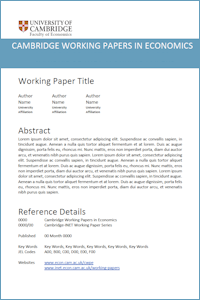
Lee, S-M., Savu, A.
Do Labels Polarise? Theory and Evidence from the Brexit Referendum
CWPE2227
Abstract: Why has geographical political polarisation increased in recent times? We propose a theoretical social learning mechanism whereby policy preferences become more homogeneous within geographical units, yet increasingly heterogeneous between units over time as voters become better informed on the views of those in their vicinity. To study our model’s predictions, we exploit the delayed implementation of Brexit and its salience in the elections following the 2016 referendum. Analysing constituency-level longitudinal-data, we find that voters updated their Brexit views after observing the referendum’s local results, and acted upon their new beliefs in the following elections. We document a two percentage-point relative decrease in the (anti-Brexit) Liberal Democrat vote share in constituencies where Leave narrowly won, mirrored by an increase for the Conservatives. Our findings have implications for how group-based identities form more broadly.
Keywords: Elections, Brexit, Local Contextual Effects, Information, Social Learning, Political Attitudes
JEL Codes: D71 D72
Author links:
PDF: https://www.econ.cam.ac.uk/research-files/repec/cam/pdf/cwpe2227.pdf 
Open Access Link: https://doi.org/10.17863/CAM.83974
